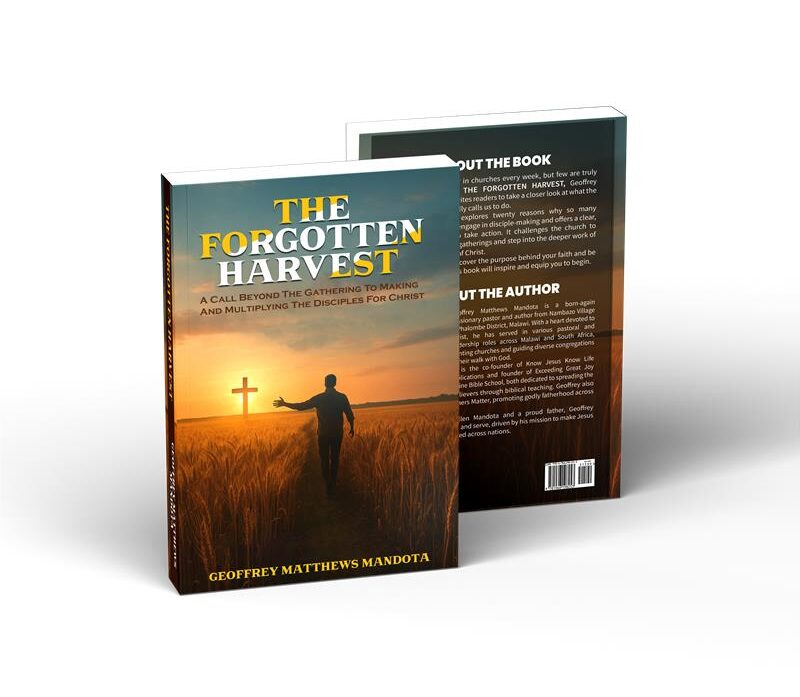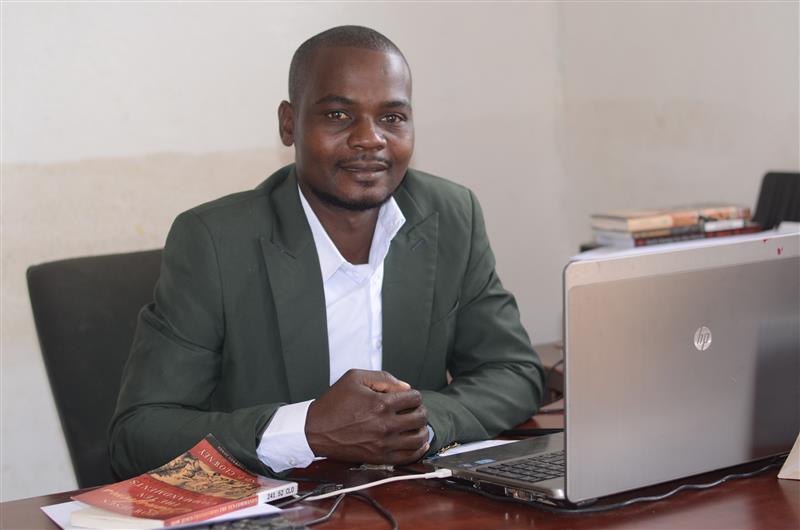The Forgotten Harvest

Some books are meant to be read and put away. Others stay with you, changing the way you see the world. The Forgotten Harvest is one of those books. Written by Geoffrey Matthews Mandota, it’s not just a message for Christians, it’s a wake-up call for anyone who believes their faith should be more than Sunday service.
At its heart, this is a story about the fields we’ve overlooked. The author uses the image of historical farming to remind us that, just like land left untended, souls can be forgotten if no one works the fields. This isn’t a quiet reflection; it’s an invitation to step into action, to take your place in a mission that spans generations.
Through scripture, personal stories, and timeless truths, Mandota connects the idea of a family novel with a much bigger family, the body of Christ. He speaks to the multi-generational call we’ve all inherited: to go out, sow the seeds, and bring in the harvest before it’s too late.
If you’ve ever felt the pull to do more, to live a faith that actually changes lives, this book will meet you there and it won’t let you leave unchanged.
The Heartbeat of the Harvest: Why the Great Commission Can’t Wait
The heartbeat of The Forgotten Harvest is simple but urgent, the Great Commission isn’t a suggestion, it’s a command. Geoffrey Matthews Mandota paints a clear picture of a church that’s too often comfortable, while the fields, both in rural fiction and real life, lie untouched. He reminds us that with over 8.2 billion people in the world, we can’t afford to be passive.
This isn’t just about preaching in big cities. It’s about small-town family drama, the quiet corners where people’s lives are shaped. It’s about stepping into family drama that goes deeper than arguments and reconciliations, the kind that asks where we stand in matters of eternity. Mandota calls us to break cycles of complacency and step into the work God has been asking us to do all along.
In his words, discipleship is not for a select few “super-Christians.” It’s a multi-generational responsibility that belongs to all of us. We are here to plant, water, and gather, to work the land of the soul as faithfully as any farmer works the soil.
The call is urgent, but the promise is worth everything: lives transformed, communities renewed, and a harvest that will last forever.
Roots in the Word: Scripture as the Foundation for the Harvest
Every movement worth joining needs a solid foundation, and The Forgotten Harvest builds on the one that has stood for centuries, the Word of God. Geoffrey Matthews Mandota takes us back to passages like Matthew 9:37–38, where Jesus said the harvest is plentiful but the workers are few. These verses are more than ancient words; they are a living call to action.
Mandota ties these truths to the rhythms of rural fiction and the beauty of small-town family drama, showing that the principles of sowing, tending, and reaping have always been part of God’s design. Just like a farmer knows his seasons, believers are meant to recognize when hearts are ready for planting or harvesting.
The book also introduces discipleship models like the “Two-Two-Two” principle and the “T-Square” method, breaking them down in plain language. They aren’t complicated formulas, they’re simple ways to keep the work going, generation after generation.
Here, the author blends scripture with real-life ministry moments, making it clear that the Bible isn’t just a guide for the past. It’s a living map for anyone willing to step into the field today, ready to sow love, truth, and hope.
From Seed to Spread: Simple Models for Lasting Discipleship
One of the strengths of The Forgotten Harvest is how it doesn’t just tell you why discipleship matters, it shows you how to do it. Geoffrey Matthews Mandota introduces simple but powerful models that can work anywhere, whether you’re in the middle of a busy city or surrounded by fields in a quiet farming town.
The “Two-Two-Two” principle, drawn from 2 Timothy 2:2, is about teaching what you’ve learned to reliable people who will pass it on again. It’s the same idea behind agricultural stories and heritage stories, planting something today that will still be growing long after you’re gone.
Then there’s the “Grandma Lois to Eunice to Timothy” example, reminding us that discipleship starts at home. Just as farms pass down traditions and techniques, faith can be handed from one generation to the next, becoming a family’s most valuable inheritance.
These models aren’t about creating programs. They’re about living intentionally, looking for every opportunity to plant seeds of truth, and trusting God to bring the growth, just as surely as a farmer trusts the harvest will come.
What’s Blocking the Field: Overcoming the Obstacles to Discipleship
In The Forgotten Harvest, Geoffrey Matthews Mandota doesn’t shy away from naming the hard truths. He lists twenty reasons why so many believers never step into the field. Some are obvious, fear, lack of urgency, poor teaching, while others creep in quietly, like pride or the belief that someone else will do the work.
He shares personal ministry stories where opportunities were missed, not because the soil wasn’t ready, but because no one showed up to plant. These moments mirror the realities in fiction about family legacies and even in farm life, where ignoring the season means losing the crop.
The book challenges the excuses we make. It’s not enough to know the message; we have to live it. In small communities, people notice when words don’t match actions. In larger settings, they can see when the church has lost its compassion.
Mandota’s point is simple: the barriers aren’t out there in the field, they’re within us. And just like a farmer prepares the ground before sowing, we have to prepare our own hearts before we can see a harvest worth bringing home.
Wisdom from the Rows: What Ministry Teaches About the Harvest
Some of the most powerful parts of The Forgotten Harvest are the real-life lessons Geoffrey Matthews Mandota has learned while serving in ministry. His experiences stretch from bustling towns to quiet farming communities, and each story ties faith to everyday life.
He draws vivid parallels between ministry work and the patterns of literary fiction, where small details build toward something greater. Just like in rural America novels, the pace might be slower, but the impact is deep and lasting. In both settings, the focus is on people, their struggles, their growth, and the relationships that shape them.
Mandota speaks of moments on African ministry fields where a single act of compassion opened the door for transformation. He recalls the patience it takes to walk alongside someone in their journey, much like tending crops through every season. You can’t rush the process, but you can remain faithful in it.
His point is clear: the harvest isn’t a quick win. It’s a lifetime of planting seeds, trusting the rain, and showing up, even on the hard days. The results may not come overnight, but when they do, they’re worth every step and every prayer.
Stepping Into the Field: Answering the Call to Change Lives
By the time you reach the final chapters of The Forgotten Harvest, the message is unmistakable, this is more than a book, it’s a personal challenge. Geoffrey Matthews Mandota calls readers to move from watching the work to joining it. It’s not just about agreeing with the Great Commission in theory; it’s about making it your daily practice.
He frames it like the sweep of historical timeline fiction and modern timeline fiction, two stories running side by side. One is the story of faith in scripture and church history. The other is the story you’re living right now. The question is whether those timelines will connect, and whether your part will show a life poured out in service.
This section doesn’t offer shortcuts. It offers a shift in perspective. Every interaction becomes a chance to plant or water seeds of faith. Every home, workplace, or community gathering becomes a field.
Mandota reminds us that the harvest is never just about numbers; it’s about people whose lives will be forever changed. And he leaves no doubt, the choice to step into the field is ours, and the time to do it is now.
Start your journey with The Forgotten Harvest, available now on Amazon.
For Amazon: Click here
The Sower Behind the Story: Geoffrey Matthews Mandota
Geoffrey Matthews Mandota writes The Forgotten Harvest from a place of deep conviction and lived experience. A pastor, teacher, and evangelist, he has served across Africa and beyond, planting churches, leading discipleship seminars, and walking alongside believers through every stage of their faith journey. His ministry is built on a simple but uncompromising belief that the Great Commission is for every Christian, in every place, at every time.
Raised with the values of hard work and persistence, Geoffrey understands the language of the field, both in farming and in faith. His own life mirrors the lessons in his book: patience in planting, faithfulness in tending, and joy in the harvest. Whether speaking to large crowds or sitting one-on-one with someone hungry for truth, his approach is always personal, compassionate, and grounded in scripture.

Through his writing, preaching, and teaching, Geoffrey invites readers to see discipleship not as a distant goal but as a daily calling. The Forgotten Harvest is more than a title; it’s the mission that drives his life. And with every page, he extends an open hand to join him in that mission, so the fields of faith are never left untended again.
Stay connected with Geoffrey Matthews Mandota on social media for the latest updates and new book announcements.
For Facebook: Click here
For Instagram: Click here
For YouTube: Click here
